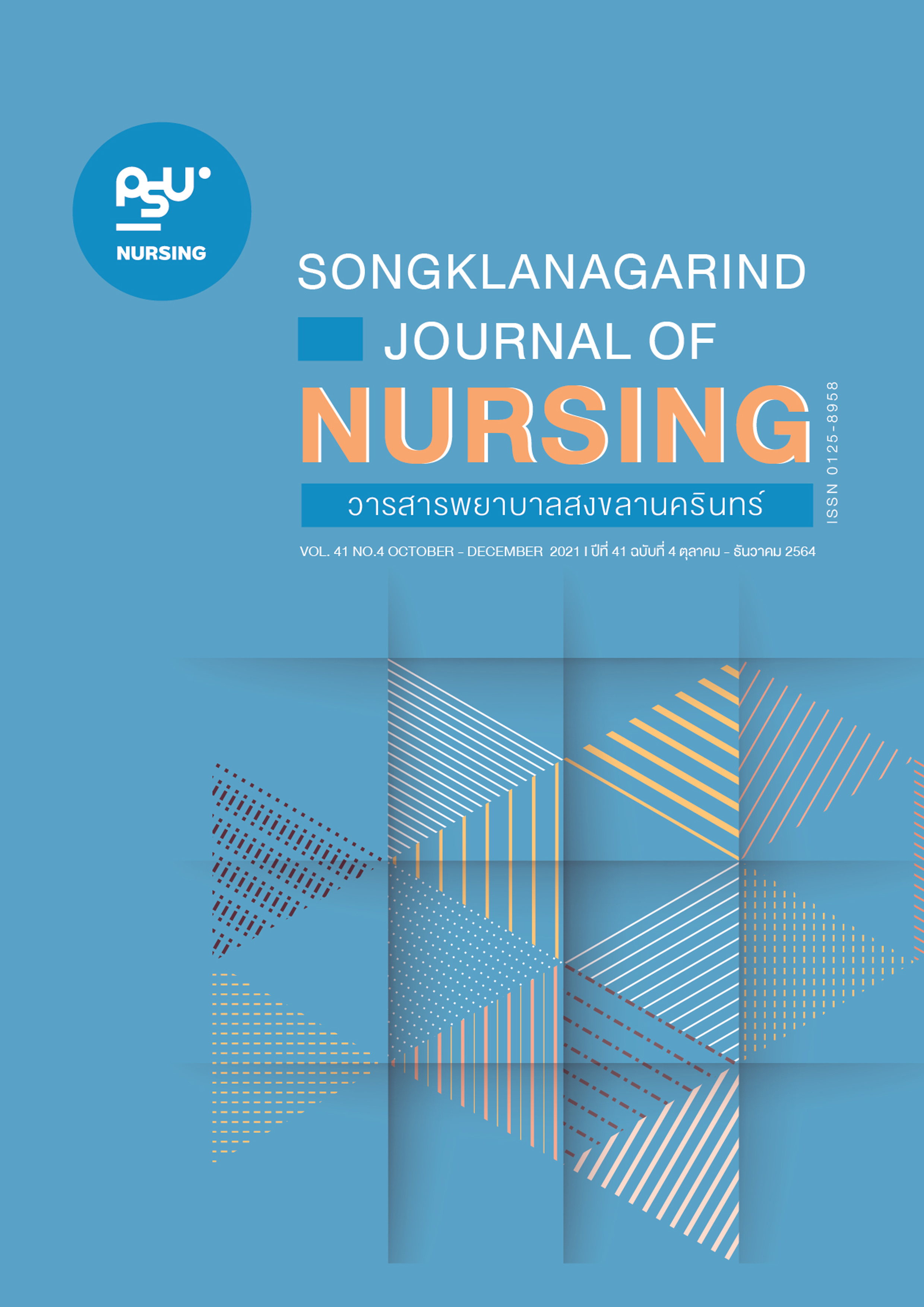สมรรถนะการเรียนรู้ตลอดชีวิตของนักศึกษาพยาบาล ปัจจัยส่งเสริมและอุปสรรคต่อการพัฒนาสมรรถนะการเรียนรู้ตลอดชีวิต
Main Article Content
บทคัดย่อ
วัตถุประสงค์: การวิจัยครั้งนี้เป็นการวิจัยเชิงพรรณนา มีวัตถุประสงค์เพื่อศึกษาสมรรถนะการเรียนรู้ตลอดชีวิตของนักศึกษาพยาบาล ปัจจัยส่งเสริมและอุปสรรคต่อการเรียนรู้ตลอดชีวิต วิธีการ: กลุ่มตัวอย่างเป็นนักศึกษาพยาบาลชั้นปีที่ 1-4 จำนวน 536 คน เก็บข้อมูลโดยการตอบแบบสอบถามสมรรถนะการเรียนรู้ซึ่งมีความตรง (S-CVI/Ave) 0.97 และแบบสัมภาษณ์ โดยผ่านผู้ทรงคุณวุฒิ วิเคราะห์ข้อมูลเชิงปริมาณโดยใช้สถิติเชิงบรรยาย และวิเคราะห์ข้อมูลเชิงคุณภาพด้วยวิธีการวิเคราะห์เนื้อหา ผลการศึกษา: ผลการศึกษา พบว่า ระดับสมรรถนะการเรียนรู้ตลอดชีวิตของกลุ่มตัวอย่างชั้นปีที่ 1-4 โดยภาพรวมอยู่ในระดับสูง (M = 4.1, SD = .41) เมื่อพิจารณารายด้าน พบว่า ด้านที่มีระดับสมรรถนะอยู่ในระดับสูงสุด ได้แก่ ด้านความร่วมมือและการทำงานเป็นทีม (M = 4.4, SD = .49) รองลงมา ได้แก่ ด้านเทคโนโลยีและสารสนเทศ (M = 4.3, SD = .52) ส่วนด้านการสร้างนวัตกรรม (M = 3.2, SD = .74) มีระดับสมรรถนะอยู่ในระดับปานกลางปัจจัยส่งเสริมการพัฒนาการเรียนรู้ตลอดชีวิต ได้แก่ 1) การออกแบบการสอนของอาจารย์ผู้สอน 2) สภาพแวดล้อมการเรียนรู้ 3) ความกระตือรือร้นและตั้งใจของนักศึกษา 4) กำลังใจจากคนรอบข้าง 5) การเป็นแบบอย่างของอาจารย์ผู้สอน 6) ความสามารถอ่านและเข้าใจภาษาอังกฤษ และ 7) พัฒนาการเรียนรู้ตลอดชีวิตอย่างเป็นระบบ ส่วนอุปสรรคต่อการเรียนรู้ตลอดชีวิต ได้แก่ ความเหนื่อยล้า และการจัดการกับเวลา สรุป: ผลการวิจัยครั้งนี้ สามารถเป็นข้อมูลพื้นฐานสำหรับหลักสูตรนำไปใช้ในการพัฒนาสมรรถนะการเรียนรู้ตลอดชีวิตให้กับนักศึกษาพยาบาล
Article Details
เอกสารอ้างอิง
Research Administration and Quality Assurance Division. Blueprint Thailand 4.0, a model Thailand driving. [Internet]. Pathum Thani: The National Science and Technology Development Agency (NSTDA); 2017 [cited 2020
Jun 16]. Available from: https://waa.inter.nstda.or.th/stks/pub/2017/20171114-draeqa-blueprint.pdf
Office of the Education Council. Thailand education plan 2017-2036 [Internet]. Bangkok: Prigwhan Graphic Limited. 2017 [cited 2020 Jun 23]. Available from: http://www.lampang.go.th/public60/EducationPlan2.pdf
Chaiya S. The developing lifelong learning skills of students in the 21 st century. EDSWU. 2019; 20(1): 168-80. Thai.
Pongsathonviboon K. Lifelong learning and nursing professional. JRTAN. 2016; 17(3): 1-9. Thai.
Panich V. Learning creating for 21 st century. Bangkok: Siam Commercial Foundation; 2012. Thai.
Chaiya S, Siribanpitak P, Sumettikoon P. Lifelong learning skills of university students: theoretical framework. JSSH. 2015; 21(3): 149-76. Thai.
Muliira JK, Etyang C, Muliira RS, et al. Nurses’ orientation toward lifelong learning: a case study of Uganda’s
National Hospital. J Contin Educ Nurs. 2012; 43(2): 90-6. doi: 10.3928/00220124-20111003-03.
Pongsathonviboon K. Development of a life-long learning assessment from for students of the Kuea Karun Faculty of Nursing, Bangkok Metropolis University. TJNC. 2013; 28(3): 43-54. Thai.
Ueangchokchai C, Ratana-Ubol A, Charungkaittikul S. The characteristics of lifelong learners for Thai youth. JES. 2016; 44(4): 63-80. Thai.
Kuanchom B, Oumtanee A, A study of lifelong learning components of professional nurses. JOPN. 2014; 6(2): 70-82. Thai.
Davis L, Taylor H, Reyes H. Lifelong learning in nursing: A delphi study. Nurse Educ Today. 2014; 34(3): 441-5. doi: 10.1016/j.nedt.2013.04.014.
Uzunboylu H, Hursen C. Lifelong learning competence scale (LLLCS): The study of validity and reliability. JOE. 2011; 41: 449-60.
Qalehsari M, Khaghanizadeh M, Ebadi A. Lifelong learning strategies in nursing: A systematic review. Electronic Physician. 2017; 9(10): 5541-50. doi: 10.19082/5541.
Bellanca J. 21 st Century skills - rethinking how student learn. Wongkijrungruang V, Chittaroung A, translator. Bangkok: Openworlds Publishing; 2011. Thai.
Singchungchai P, Khampalikit S, Nasae T. Nursing research: principle and process. Songklha; Team Printing; 1996. Thai.
Chirawatkul S. Qualitative study nursing: Research methodology and case in study. 2 nd ed. Bangkok: S. Asia
press; 2012. Thai.
Saraketrin A, Rongmuang D, Chantra R. Nursing education in the 21 st Century: Competencies and roles of nursing instructors. JRTAN. 2019; 20(1): 12-20. Thai.
Surakarn A, Junprasert T, Chaiakkarakkan N, et al. Active learning and its outcomes: A case study from the education reform project in Thailand. Behav Sci. 2020; 15(1): 34-51. Thai.
Rongmuang D. Learning atmosphere, satisfaction with learning management in 21 st century and academic
achievement among Bachelor in Nursing Science students. SCNJ. 2019; 6(1): 167-77. Thai.
Chantra R, Sarakshetrin A. Learning skills in 21 st Century of nursing students at Boromarajonani College of Nursing, Suratthani. SCNJ. 2017; 6(1): 180-90. Thai.
Chaikongiat P, Niha S, Chantarasiripoot B. 21 st Century learning skills of nursing students: A survey research in Yala. SCNJ. 2019; 6(1): 112-20. Thai.
Wongsaree C. Clinical teaching in adult nursing practicum course for generation z collegian. JBCN_Bangkok. 2015; 31(2): 130-40. Thai.
Chaleoykitti S, Artsanthia J, Daodee M. The effect of COVID-19 disease: teaching and learning in nursing. JHNR. 2020; 36(2): 255-62.Thai.
Armpen C, Tarmong C, Netgrajang C, et al. Factors correlated with perception toward 21 st century learning skills among nursing students, Phrapokklao Nursing College. JPNC. 2018; 29(2): 36-46. Thai.


